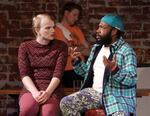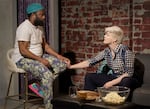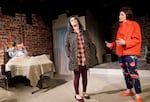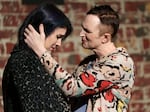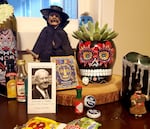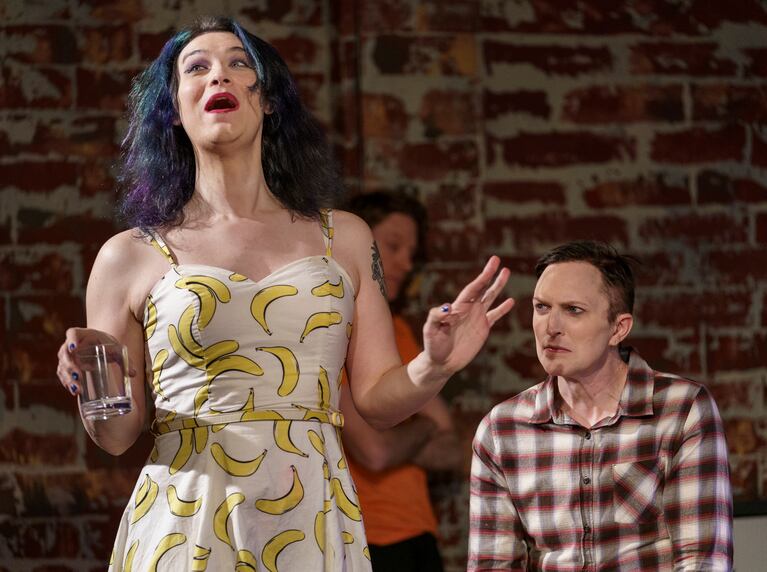
Juliet Mylan, left, plays Ally, along with Harper York who plays Terry/Andrea, in rehearsal on March 9, 2022, for Mikki Gillette’s first staged play, “The Queers.” Gillette says the show is semi-autobiographical, based on experiences she had living openly as a transgender woman.
Kristyna Wentz-Graff / OPB
The ensemble drama “The Queers” follows a group of transgender women and nonbinary people as they navigate life together in a transphobic world. Set in 2011 in a city like Portland, the play centers on Lisa, Ally, Andrea, Smith and Pim, many of whom are brought together by a support group. They process job discrimination, family rejection, relationships, long-term trauma, the challenges of activism and more, in community with one another.
The play, produced by Fuse Theatre Ensemble, was originally set to take the stage in January 2022, but its premiere was delayed by the omicron surge. Now, “The Queers” is onstage through April 10th at Portland’s Back Door Theater. And it provides something special for Oregon theater: a play about transgender characters, starring an ensemble cast of transgender actors, written by a transgender playwright. Its writer, Mikki Gillette, recently joined OPB to talk about the play and her work as an artist and activist. Here are some highlights of the conversation:

Playwright Mikki Gillette’s first staged play, “The Queers,” is the story of people healing from transphobia. Gillette says the show is semi-autobiographical, based on experiences she had living openly as a transgender woman.
Kristyna Wentz-Graff / OPB
Jenn Chávez: The play opens with a scene between a character named Lisa and her supervisor at the school where she substitute teaches. She finds out she’s been falsely accused of being inappropriate towards her students. Over the course of the conversation, her supervisor misgenders her and calls her by her old name - deadnames her. Workplace discrimination is something that most of your characters in “The Queers” have dealt with. How does that common experience play a role in their stories?
Mikki Gillette: Well, I think it feels almost inevitable, because it’s a transphobic world that they’re in, and everybody has to work if they want to support themselves in our society. I remember the 2015 US Trans Survey, which was done by the National Center for Transgender Equality, found that 90% of respondents had experienced workplace harassment, and it’s something that I went through too, in the first few years of my transition.
Chávez: This is an ensemble drama - so rather than telling the story of just one trans character, you’re portraying trans folks in community with one another. Why was it important to you to show trans characters’ friendships and relationships with one another?
Gillette: Being transgender — especially, this play is set in 2011 - it’s such a unique experience, and trans people were not very understood or very visible at the time. So, I think the community kind of gravitates together because they need a reflection of themselves, they need to process what’s happening for them. But it’s tricky, because most of the people in the community are under a great deal of stress, because of discrimination and issues like poverty. And so, people need things, but maybe not everybody has enough space to give back. Also, it’s people who have one thing in common, but not necessarily other things. People might have had different life experiences before then, or have different values. There’s something very dramatic about all these people being thrown in together and trying to navigate relationships, on top of everything else that’s happening in their lives.
Chávez: Another thing these characters grapple with is how to engage in activism and community care while dealing with their own trauma and their own mental health. You are an activist yourself, and you also do professional advocacy work in addition to your work as an artist. How do you think about these things: doing activism and community care in the face of trauma?
Gillette: I think in the first few years, I was very driven by this personal sense of… peril, I guess. Just, not knowing if I was going to be okay if I was going to be able to support myself, if me or the people around me were going to be physically safe. And then, as I’ve felt more stable in my life, I still feel a strong drive to give ]back and to try to make a better world for the people who are going to come after me … but I also have boundaries, and balance is very important in my life. Sometimes I feel guilty about that because there are other people who give more, or who don’t necessarily clock out at the end of the day. But I know, for my own well-being, it’s important to have that kind of balance.
Chávez: Can you talk a little bit about how your characters wrestle with this?
Gillette: In the play there are a lot of different responses to that. There’s a character, Smith, whose job is to be an activist, and they don’t really have an off switch, and it’s explored that that comes out of a wound that they never really resolved about feeling abandoned early in their transition. And then, Lisa is different. She had kind of separated from the community, she’d had a bad dating experience and just decided that the people there were too much, but then she comes back when she has this work experience and needs Smith’s help, and then has to grapple with the guilt that she feels about having gone away. There’s a character, Pim, who’s maybe a voice of reason, who talks about working an eight-hour day. So, it’s an open question. I think it’s something that everyone has to decide for themselves because once you really face the kind of need that the community has, you have to think about what your role is going to be in trying to meet that.
Chávez: There are definitely moments of dark humor, and also of healing in this play. But I think the trauma of transphobia is really a central theme for every character. Why did you choose to write a work that centers on trauma and even, at times, suicidality?
Gillette: I think it came out of a really specific moment in my life when I was writing it. It was a time when I was thinking about gender nonstop, it couldn’t really turn off in my mind. I was really steeped in reading about it, and also attending a lot of community events. And there was this... yeah, just this confusion. Inside I felt a kind of elation at finally being myself and being seen as myself, but then there was so much sorrow too, and so much pain, that was coming out of negative experiences and hearing about the negative experiences of others. And I don’t think I had really been able to process all of that, and this play was kind of a way of doing that. I didn’t really understand the play that well after I wrote it, and I didn’t love it for a little while. Once I had some distance from it, I saw that this was a way of trying to get my head around something that was just too big at the time. And so, I like that aspect of it. It feels a little mysterious, because it’s not something I could have just sat down and written linearly. … It would have been hard for me to write about the trans experience without addressing that trauma, because I felt like, especially at that time, the grief of having lost so much of my life being closeted was really at the forefront of my mind. How I was responding to that, and how I was seeing other people respond to that, was just this really big question for me.
Chávez: You wrote this play around the time when it was set, in 2011, and as you’re talking about, you’re in a different phase of your own life, and we’re also in a different phase of the world right now. If you were writing a play like this today, do you think it would be different?
Gillette: Yeah, I think it would, because on a macro level, the world felt safer. It didn’t feel like democracy was in peril, and it didn’t feel like conservative politicians were actively attacking the trans community, because there wasn’t that much visibility. So it was on the micro-level that people were experiencing things like personal alienation or job discrimination or family rejection. I don’t think those things, those micro things, are as big for the community anymore. But the macro things just seem so threatening. If someone was the parent of a trans child in Texas right now, I think they’d have to be wondering whether they could stay there. Or if there was a trans adult in Florida looking at the “Don’t Say Gay” bill, they might wonder, “how could this be the government that I’m living under in my state?” And so, I think the questions that were being asked or the things that were on the characters minds would be different today.
Chávez: Since we talked about why this play that you wrote explores trauma, I want to ask: what moments of joy do you see for your characters?
Gillette: Well, there’s a character named Terry who later changes her name to Andrea, and she goes to a bar with the community members she’s met and it’s her first time out dressed as herself. And the actress, Harper York, really kind of embodies this: she’s dancing at the table, even though the audience doesn’t hear the music, and she’s jumping up and down in excitement about having created a transition plan at her work, and that’s kind of fun to see.
Chávez: [What about] moments of joy for you right now? Are there things that give you hope and joy right now?
Gillette: Well, for me it’s so great to sit in the audience and watch these actors. There’s five trans actors in the cast and they have such a variety of experiences and backgrounds. Kyran McCoy plays Smith, and this is the first time he’s ever acted in a play. He took it on because we needed someone, and we were trying to cast and didn’t really have other actors, and he said “yeah, I’ll try to do it, I want to help!” And I think he might have the most lines in the whole play, and the final week he was really like, “wow, this is a lot!” And then, opening night, he was great, he had learned all his lines, the audience loved him, he had built these little moments of humor into the play, and every one of them just killed with the audience. So, I’m so happy to watch him blossom and succeed as an actor. It’s little things like that that are giving me joy now, just getting to watch what they’ve all created. … To me, it’s special that this is sort of a milestone, a trans play written by a trans playwright starring trans actors. And I hope that people will come and experience that, and especially I hope theater folk might come and see: “oh wow, look at these talented people who haven’t been on our radar. I need them in my play too.” That would be great, if this was the start of something.



